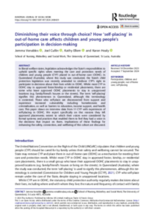In liberal welfare states, legislation acknowledges the State’s responsibilities to uphold specific rights when meeting the care and protection needs of children and young people (CYP) placed in out-of-home care (OOHC). In Queensland (Australia), where this study was conducted, the State’s child protection legislation was recently amended to reinforce CYP’s right to participate in decisions about their lives whilst in OOHC.
Whilst most CYP in OOHC stay in approved foster/kinship or residential placements, there are some who leave approved OOHC placements to stay in unapproved locations (e.g. family/friend’s houses or the streets). The term ‘self-placing’ signifies this phenomenon in Queensland, although this terminology is contested. Those who self-place are disconnected from support and experience increased vulnerability including homelessness and criminalisation, as well as barriers to education, income support, and health care.
This paper draws on interview data from 11 CYP with experiences of self-placing in OOHC. The authors report specifically on the: reasons they left approved placements; extent to which their voices were considered by formal systems; and practices that enabled them to feel they had a voice in the decisions that impact on them. Implications of these findings for enhancing the safety, connection, and wellbeing of this cohort are discussed.

